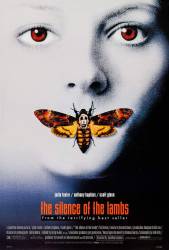Character mistake: Buffalo Bill's revolver is a double action, meaning did not need to cock his gun before firing it (you only need to do so with single-action revolvers. Cocking a double-action just makes the next trigger pull easier.) He could've just shot Starling. His stupidity got him killed.
Character mistake: Dissecting the chrysalis, Dr. Roden says that "Somebody grew this guy. Fed him honey and nightshade." Nightshade is indeed one of the typical plants eaten by the Death's head moth, but since "he" is only a pupa, would have not eaten honey, which is something only the adult specimen eats. (00:48:50)
Suggested correction: I don't see this so much as a mistake, but rather a shortcut so there would be no need to explain the entire metamorphosis process. Feeding "it" would refer to the larva stage, necessary to reach (grow to) the pupa stage. "It" may have transformed, but "it" is still the same "it." The men working there are experts and would know what he means, not interrupt and say, "Pupae don't eat, dumb @$$." Likewise, having to specifically say that someone fed the larva "honey and Nightshade" so that it would become that pupa doesn't seem to be necessary given the nature of the film. [And the larva - not just "adults" - might eat honey.].
Sorry, I don't really understand the point of the first part (like, 90%) of the correction; at no point I was disputing the concept of 'feeding a pupa', but just what it could have eaten to be raised to that stage. The only relevant part of your correction is that last phrase; "And the larva might eat honey." Which is not how it works from what I understand. If you want to correct this entry, please dispute that aspect; I never bred bugs (...on purpose!) and surely not of that kind, but the larvae of that species are strictly herbivores, and the honey plays into their diet only later in life - to the best of my knowledge they can't even process it at that stage. Assuming it can (which I have no particular reason to believe), it would be an exception and not what an entomologist would say to describe a well raised specimen. For what it is worth, also, Harris' novel never mentions honey, but specifically leaves, although it's a different plant.
Sorry if I misconstrued what you were trying to say. By writing that the pupa would not eat something only the adults eat, you left the impression that the pupa eats other things (just not the honey). I think I understand now. Your answer is specific to the honey and my response addressed how much information the experts needed to present about metamorphosis and food/no food to the audience. I hope this helps you understand at least some of that 90%.
Character mistake: Clarice was given clear, explicit instructions by Crawford before going to the asylum to see Lecter, including: do not touch the glass; do not approach the glass; tell him nothing personal; do not accept anything from him. Barney also gave the specific rules to Clarice when she got there (e.g, "you don't get near the glass"; use the food tray carrier to give him papers), and informed her he would be watching her on video. An FBI Agent TRAINEE is under close scrutiny and failure to meet the high standards and/or rigorous training can/will result in dismissal from the academy; a student must follow the rules and demonstrate she has what it takes to graduate and is suitable to become a member of the FBI. Given the high standards and relative difficulty in securing a position with the FBI, a trainee would not blatantly break the rules or virtually disregard the direct orders of a supervisor like Clarice did - especially during the very first assignment. The end does not justify the means.
Character mistake: When the scientists cut open the cocoon found in the throat of a murder victim, they are not wearing gloves even though Clarice specifically states that it was found behind the soft palate of a murder victim. (00:48:00)





